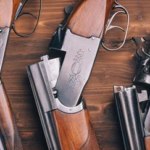AT THE RISK of beating the issue to death — but at the request of someone posting here — I’ve pulled this out of a prior thread, as my summary statement on the “gun control” issue. I’m posting here, then I’m checking out:
The Declaration of Independence was the manifesto that set the philosophical rationale for the later Constitution. It is impossible to understand the Constitution and its provisions, including the Amendments, accurately or coherently or intelligibly without reference to that earlier rationale. And the Declaration specified that it was “to secure these rights” to “life, liberty, and the pursuit of happiness” that governments were instituted. The right to individual life and liberty requires defense and protection, and that was their rationale for the Constitution.
Those were “natural rights,” and not the “civil (or “legal”) rights” enumerated in the Constitution. It is a crucial distinction, and in his own essay about “Natural Rights, Civil Rights, and Guns,” John McCaskey makes the distinction clear and illuminating. (See it here: http://www.johnmccaskey.com/guns/ ) A natural right pre-exists government, arising from the nature and needs of individuals in society. A civil (or legal) right is a specific procedural grant of liberty from the government, ideally aimed at securing a more fundamental natural right. For example, a natural right of individuals is to move around freely in society. A corresponding civil right may be the right to drive an automobile, or to fly an airplane in airspace above people’s homes.
A key difference is that fundamental natural rights may not be abrogated by government. However, an enabling or implementing civil/legal right MAY be changed and altered in all kinds of ways, depending on circumstances and contexts. To follow the preceding example: The government may not interfere with my right to travel; but the government may determine whether I should have a license to drive a car or fly a plane, based on considerations of my abilities and responsibility.
Unlike the Declaration (which deals with “natural rights”), the Second Amendment (like the rest of the Constitution) deals only with “civil rights” — specific, procedural rights granted by the government. And as grant of civil rights, the Second Amendment was grounded in the specific context of its time: the existence of a host of “free states,” and their (civil, legal) right to raise “a well-regulated militia” for their own internal defense. Well, that contextual rationale has not been relevant since the Civil War. So if “the right of the people to keep and bear arms shall not be infringed,” then it must rest on a different, more relevant contextual rationale than anachronistic state militias.
McCaskey argues — as I have — that the ONLY proper rationale for a CIVIL “right to keep and bear arms” rests upon a more fundamental NATURAL right: *the individual right to self-defense.* That is the only rationale consistent with the one offered in the Declaration of Independence.
But — and this is critical — both McCaskey and I argue that HOW the “individual right to self-defense” is to be implemented in civil law is always affected by context: by time, place, circumstance. For primitives in a jungle, the natural right to self-defense against hostile tribes and wild animals might have required tribal recognition of an individual’s right to carry spears, tomahawks, and clubs. In 1789, it might be the right to carry muskets, pistols, swords, and rifles. In a city today, it might be pepper spray or knives or Tasers or handguns.
As long as the natural individual right to self-defense is legally enabled and secured by civil law in contextually practical, effective ways, then the government has met its fundamental obligation “to secure these [natural] rights.” However, in order to meet that burden, it need not grant a CIVIL (legal/procedural) right for an individual to have access to, possess, or use ANY AND ALL armaments, in any place or circumstance.
WHICH sort of “arms,” HOW they are to be used, WHEN, and WHERE, are civil/legal determinations. To be consistent with the natural right to self-defense, the arms need only be effective for that purpose, while they are also consistent with overall public safety.
As McCaskey puts it,
“If there is a legitimate civil right to guns, the timeless, inborn, natural, inalienable right to self-defense is its only possible moral justification….Any legitimate government has a charter to devise and implement civil rights that make self-defense legal and practicable. For cases where effective government security forces cannot be right at hand to do the job, denying a person effective tools for self-defense, when he or she is in immediate danger, is a violation of the inalienable natural right of self-defense and is morally wrong, even if violating that right could be said to have some benefit to society as a whole.
“What access to arms citizens should be allowed to own and use depends heavily on social and technological conditions….Any properly legal exercise of force by one citizen against another is the exercise of a civil right granted by the government.
“This does not mean, however, that such grants need be subjective. A proper government grants such rights objectively. The prevailing social and technological conditions objectively necessitate some such grants and objectively prohibit others. What is objective depends on the context.
“Is the land sparsely populated, or densely? How much firepower does the government have at its disposal? How quickly can it bring that to bear? Where are the threats? What are the threats? Snakes or criminals? Big snakes or little ones? What firepower do the criminals have? Is there a police force? (There was not when the US Constitution was written.) Are we talking about Afghanistan, Israel, or Chicago?
“In rural Alaska where there is no 9-1-1 and more bears than people, it might be wrong for the government to limit citizens’ access to rifles. In a big city, where the police can helicopter in a SWAT team in 4.3 minutes, different gun limits are appropriate. It matters what kinds of weapons common criminals are carrying. If they are all carrying neutron-powered gamma-ray blasters and no other defensive weapon is available, then the government must allow its citizens to carry neutron-powered gamma-ray blasters or find some other way to protect them….
“All would be much simpler and morally sounder if there were a clause in the Constitution saying in plain and explicit language that Congress shall make no laws denying citizens effective means of self-defense….Those wanting a morally strong argument for gun ownership should demand, primarily, protection of the natural right to self-defense and not of the civil rights of the Second Amendment.”
I agree with the thrust of this. In sum, you have the inalienable natural right to self-defense. But there is no inalienable natural right to carry a particular weapons system. And here’s the reason: *The use of force in society must be carefully regulated by the government in order to prevent a collapse into crime, chaos, and civil war.* Government must insure that the use of force is purely DEFENSIVE, NOT AGGRESSIVE OR MENACING. To protect innocent people from danger, coercion, and aggression, so that they may go about their lives free and unmolested, government may thus impose reasonable, contextual, civil regulations upon weapons and their use, based on considerations of location, population density, the sanity and responsibility of the owner/user, and the nature of the threats faced by individuals.
There’s a lot more in McCaskey’s excellent article, particularly dealing with the issue of taking up arms against tyranny. I thank several folks here for calling the piece to my attention. I’m glad that McCaskey and I arrived at roughly congruent conclusions independently, although he’s clearly given the issue much more intensive consideration than I.
If I were to part company from McCaskey anywhere, it would be over the applicability of property rights to weapons. Since virtually anything can be used as a weapon, yet we don’t ban or heavily regulate them on that ground, I believe that a distinction should be made between “possession” and “use.” My criteria are:
1. On grounds of property rights, individuals should be allowed to own weapons useful for self-defense, recreation, and collecting, but which pose little or no *inherent* danger or threat when properly maintained, stored, or used.
2. However, these weapons may be subject to laws and regulations to assure that they ARE properly maintained, stored, transported, and used, including contextual considerations such as the age, training, and responsibility of the owner; the “firepower” of the weapon; and the location and population density where it would be used. This would probably include automatic-fire weapons and high-caliber ammo — safe in certain circumstances, but too risky in others.
3. Finally, certain weapons and materials which pose *inherent* risks to innocent people — e.g., military-grade weapons that unavoidably inflict mass, indiscriminate casualties, thereby making them impossible to use for purely defensive purposes — should be banned for private ownership or use.



